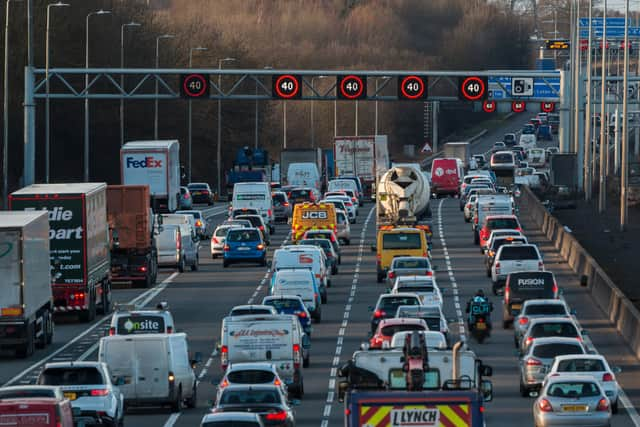Six in 10 want all-lane running smart motorways scrapped
and live on Freeview channel 276
Almost two-thirds of drivers think all-lane running smart motorways should be scrapped.
Sixty-two per cent of drivers believe that while some smart motorway technology should remain in place, the hard shoulder should be reinstated and all-lane running (ALR) abandoned.
Advertisement
Hide AdAdvertisement
Hide AdA similar proportion believe that the measures currently in place to compensate for the loss of the hard shoulder are inadequate.
Just one in four drivers thinks that the Government should continue with its current policy of turning the hard shoulder into a live lane and replacing it with occasional emergency refuge areas.
The findings from the RAC come as parliament continues to consult on the implementation of smart motorways amid concern over their safety.
The results of the RAC’s Report on Motoring suggest that many drivers are still not convinced the new motorways are safe to use. Eighty-four per cent said they thought safety was compromised by the removal of the hard shoulder and 70 per cent doubted National Highways’ ability to spot a stranded vehicle and take appropriate action.
Advertisement
Hide AdAdvertisement
Hide AdThe Department for Transport insists that “in most ways, smart motorways are as safe as, or safer than, conventional motorways”. However, it announced in 2020 it was scrapping the use of dynamic hard shoulders, and earlier this year said no new stretches of ALR road will be opened without additional safety measures.
Figures submitted by Highways England’s to the House of Commons transport committee also show that in 2018 and 2019 ALR roads had more deaths per hundred million miles than regular motorways with a hard shoulder.


The RAC study found that most drivers supported bringing back the hard shoulder while retaining the vehicle monitoring and traffic management aspects of smart motorways through cameras and overhead signs.
RAC head of roads policy Nicholas Lyes said the study showed significant opposition to the Government’s approach.
Advertisement
Hide AdAdvertisement
Hide AdHe commented: “We’ve always had safety concerns about all-lane-running motorways and have raised these by giving evidence to two separate transport committee inquiries.
“While the Government published its 18-point action plan in 2020, the RAC has continued to push for new safety features to be introduced as quickly as possible. Although much of the plan is on track and the installation of crucial stopped vehicle detection technology is now due to be completed ahead of schedule, it seems the only thing that will truly satisfy most drivers is the reinstatement of the hard shoulder.”
He said the Government faced a “difficult” choice of pressing on with its unpopular ALR programme or reverting to more traditional motorways with hard shoulders. He also suggested that a third method, involving the reintroduction of dynamic hard shoulders, should be considered.
He said: “Rather than simply scrapping dynamic hard shoulder schemes, these schemes could be made the new standard as they still offer somewhere to stop away from live traffic in the event of a breakdown during quieter times, while still accommodating more traffic at busy times. They have also demonstrated greater levels of safety. What’s more, all the technology that’s been installed for all-lane-running would continue to be of valuable use, making dynamic hard shoulder schemes even safer.”
Comment Guidelines
National World encourages reader discussion on our stories. User feedback, insights and back-and-forth exchanges add a rich layer of context to reporting. Please review our Community Guidelines before commenting.
